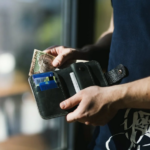Are you ready for a disaster? Having listened to the news of natural disasters in the recent months, I cannot stop thinking about the turbulence that survivors must experience. I am sure that your life should be confusing and traumatic in light of physical and financial loss. Then I started thinking about things that nobody wants to think about and how to protect their finances before disaster strikes. If the disaster is natural that affects the process of protecting your savings or a fire that destroyed a single house, the consequences for the survivors are real and go far beyond visual destruction.
Maintain a Good Plan
It is important to have a plan that protects you and your family should take a tragedy, and you will not be able to live at home or go to give some time to work. If you had only a few moments of time to leave your home and could not go back for days or even weeks, what would you do and how would you use to access cash, banking information, identification or important information? These are just some tips on how to prepare for a disaster before it is too late.
Think About What Might Happen
Determine the most likely hazards and plan accordingly. For example, do you live in a community susceptible to tornadoes, hurricanes, or forest fires? Preparation for any type of disaster may vary, but there are some things everyone should do. Talk to your local emergency management office for tips and recommendations on how to prepare for a disaster.
Check Your Landlord’s or Tenant’s Coverage and Car Insurance
Regularly check your landlord’s or tenant’s coverage and car insurance. What does your policy really cover? Most policies for homeowners do not cover floods or seismic damage. If you live in an area that is vulnerable to these disasters, you may want to buy a separate policy for this coverage. The goal is to have sufficient coverage to repair the damage to your home, your cars, and other valuable assets and to you and your family when necessary to provide temporary housing.

Records of Your Personal Property
Keep records of your personal property and include the estimated value. Many insurance agents encourage their clients to take regular video images of their home and store it outside the home if they have to file a lawsuit.
Register for Direct Deposit if Your Company Offers It
By sending your funds directly to your bank, you can make sure you can quickly access these funds when you need them. Direct deposit also avoids the risk of loss, delay or theft of checks. Consider setting up your computer or smartphone access to your bank accounts so you can manage your accounts online from anywhere without writing checks.
Have an Emergency Savings Fund
 The disaster can affect your ability to work or your income over a period of time. Therefore, a savings account can help you during a difficult economic period without having to borrow or borrow money from your family. Experts suggest that you should have 3 to 5 months in your savings for emergencies. And remember, your money is safer in your FDIC or NCUA insured institution than if it’s hidden under your mattress.
The disaster can affect your ability to work or your income over a period of time. Therefore, a savings account can help you during a difficult economic period without having to borrow or borrow money from your family. Experts suggest that you should have 3 to 5 months in your savings for emergencies. And remember, your money is safer in your FDIC or NCUA insured institution than if it’s hidden under your mattress.
- Back up important information. Scan, for example, your license, your social security card, your credit cards or your home inventory and store the copies in a safe place, for example.
- Know where all the important information is stored and store it in your home. If you need to evacuate quickly, you can go to a place and get quick access. Being organized is essential.







